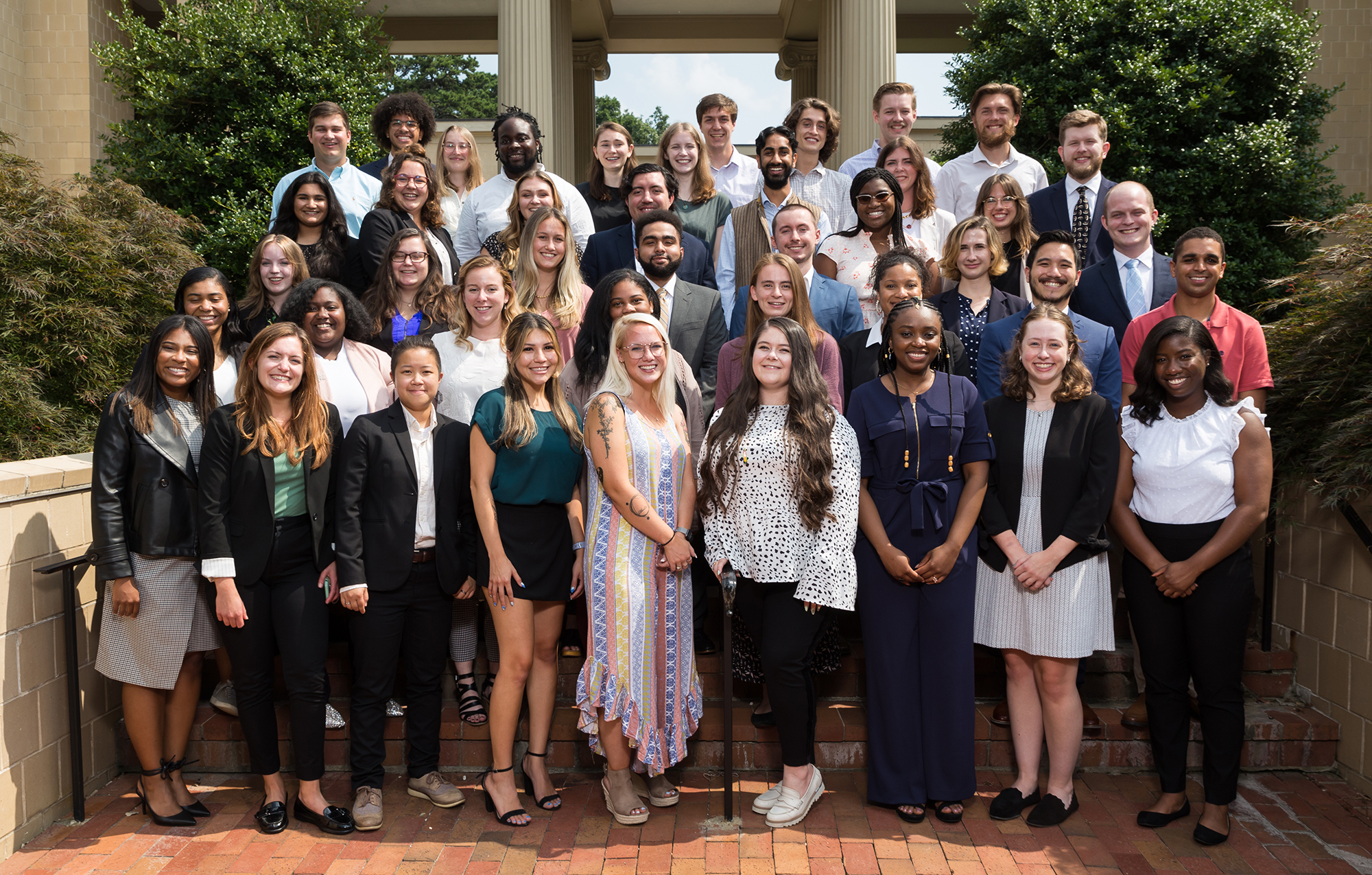Renewal funding from Z. Smith Reynolds Foundation supports Lead for North Carolina's work in local communities
While riding in a sanitation truck along its route in McDowell County, Maëva Hassani realized that county government touches everyone. During her year as a Lead for North Carolina (LFNC) Fellow, she has helped with a project that hooks more McDowell County residents up to water service; ridden along with paramedics; and visited the Emergency Operations Center, public library, and more. “I’ve gotten to learn a little bit of everything about the county,” Hassani said. “And that’s what I’ve really enjoyed, is putting myself a little bit everywhere, and realizing that there’s so much more going on than I’ve ever thought.”
Through the LFNC program, Hassani and 24 other young leaders are spending a year in local communities across the state, helping to advance key community development initiatives in their jurisdictions.
Thanks to another one-year grant from the Z. Smith Reynolds Foundation, among others, the fellows are increasing capacity within town hall and making government more accessible to all residents. Z. Smith Reynolds renewed its support of LFNC in fall 2021 for its efforts to strengthen democracy—one of four priority areas of the Foundation’s State-Level Systemic Change Strategy.
“The Z. Smith Reynolds Foundation believes the quality of life of the people of North Carolina depends, in large part, on an informed and involved populace that is able to exercise its individual rights and come together for a common purpose,” said Maurice “Mo” Green, executive director of the Z. Smith Reynolds Foundation. “We are proud to partner with Lead for North Carolina and the work it is doing to strengthen democracy by involving young people in ensuring that public institutions and processes are effective, transparent, accountable, accessible and inclusive.”
“We are grateful to the Z. Smith Reynolds Foundation for their continued support of LFNC,” said Dylan Russell, LFNC executive director. “Their support is an investment in North Carolina’s young leaders, and it helps cultivate diversity in local governments.”
After emigrating from France when she was 12, Hassani grew up in Forest City, in Rutherford County. By the time she applied to the LFNC program, she had a resume full of work and leadership credentials. She was student body president in middle school and began working full time when she was 16. In high school, she participated in leadership clubs and athletics, and carried a full course load. “I like being busy and I love people,” she said.
Hassani continued this productivity at Western Carolina University, joining the Black Student Union and Alpha Kappa Alpha Sorority Inc., and taking on leadership roles in each, while waitressing 30-plus hours per week. She earned her degree in criminal justice with a minor in Spanish, in three years.
She thought she would immediately apply to law schools, but when a professor forwarded her the LFNC application, she was intrigued. “The thing that caught my eye was it said, ‘Start where you live’,” she said. “I always say, you don’t know the impact you can make. The smallest thing can be a huge impact, no matter where you are. So that was kind of my thing.”
Hassani applied for the fellowship position with McDowell County, which borders Rutherford County. Close to home.
In Montgomery County, LFNC Fellow Mya Ellis works for the Town of Biscoe. She joined Town Manager Brandon Holland’s staff of 22 in August 2021.
On Ellis’s first day, Holland announced in a meeting full of department heads that Ellis would coordinate Biscoe’s event for National Night Out, a nationwide program for law enforcement outreach. Ellis remembered panicking a bit: “I was like, oh, not on the first day!” she said. But she quickly realized that she could handle what Holland assigned her. “I just thank him so much for doing that, because it helped me get the ball rolling in the program,” she said.
Connecting the 2,200 citizens of Biscoe with its police department has been one of Ellis’s main contributions, Holland said. Ellis had experience from when she worked with the Charlotte-Mecklenburg Police Department during high school and majoring in criminal justice at Winston-Salem State University. “Her previous involvement with law enforcement agencies has given her a lot of creativity and a different set of eyes to what our law enforcement is doing here,” Holland said. Mya researched, found, and encouraged the Biscoe Police to apply for a $60,000 community policing grant from the U.S. Dept. of Justice. “We have built our community policing efforts from the ground. Our police department in partnership with Mya has been able to do some creative things to keep engaging with the community,” Holland said.
To date, LFNC fellows have secured more than $15 million in grant funding (state, federal, and private grants) to advance key initiatives in the communities where the work. They are building financial capacity and increasing diversity within local government offices across the state. Seventy percent of fellows are women, and 48 percent identify as a racial minority. Nationally, only 25 percent of local government leaders are women and only seven percent are people of color. LFNC is providing young people, particularly those from underrepresented backgrounds, a clear pathway to public service. It’s also providing North Carolina governments with highly qualified employees in a highly competitive job market.
“Government work best when diverse stakeholders are at the table,” Russell said. “LFNC connects the most diverse generation in our nation’s history with high-impact, transformative opportunities in public institutions and organizations.”
LFNC also received funding from the State Employees’ Credit Union Foundation, AmeriCorps, Golden LEAF Foundation, Jessie Ball duPont Fund, the North Carolina League of Municipalities, State Farm, and Wells Fargo. The League is joined by other state partner organizations, including the North Carolina Association of County Commissioners and the North Carolina City and County Management Association.
Published April 19, 2022



